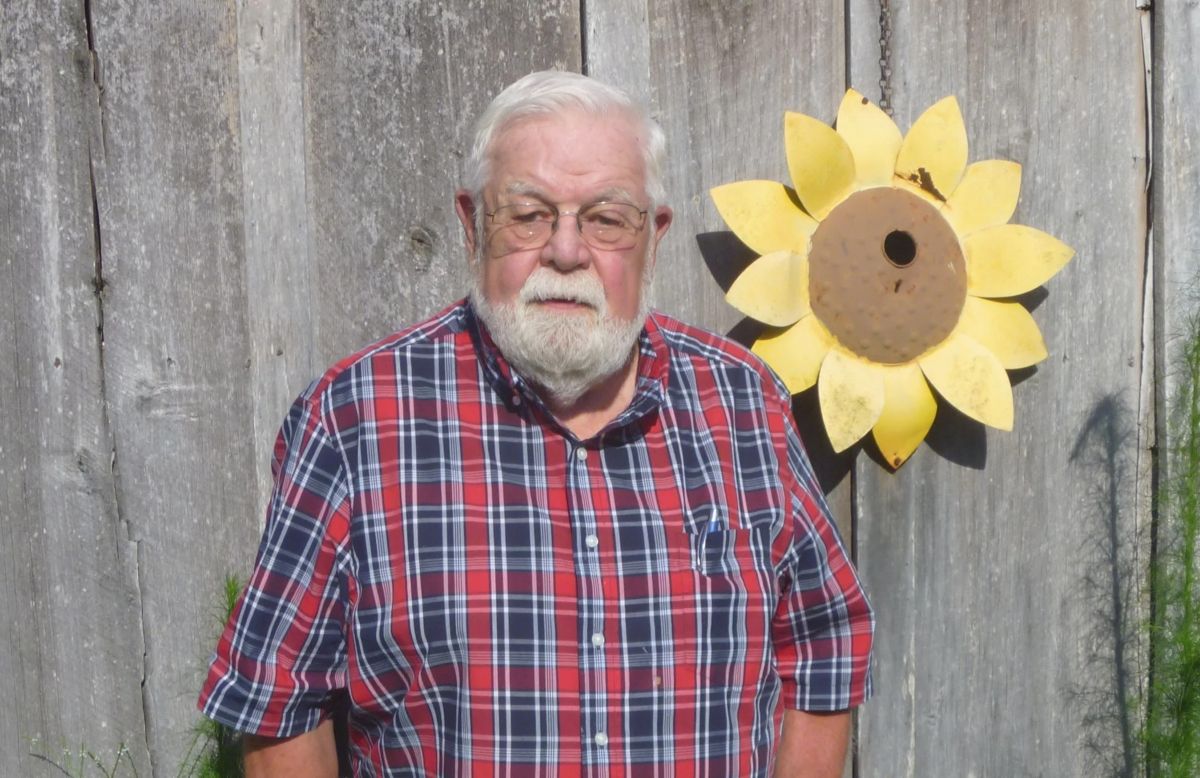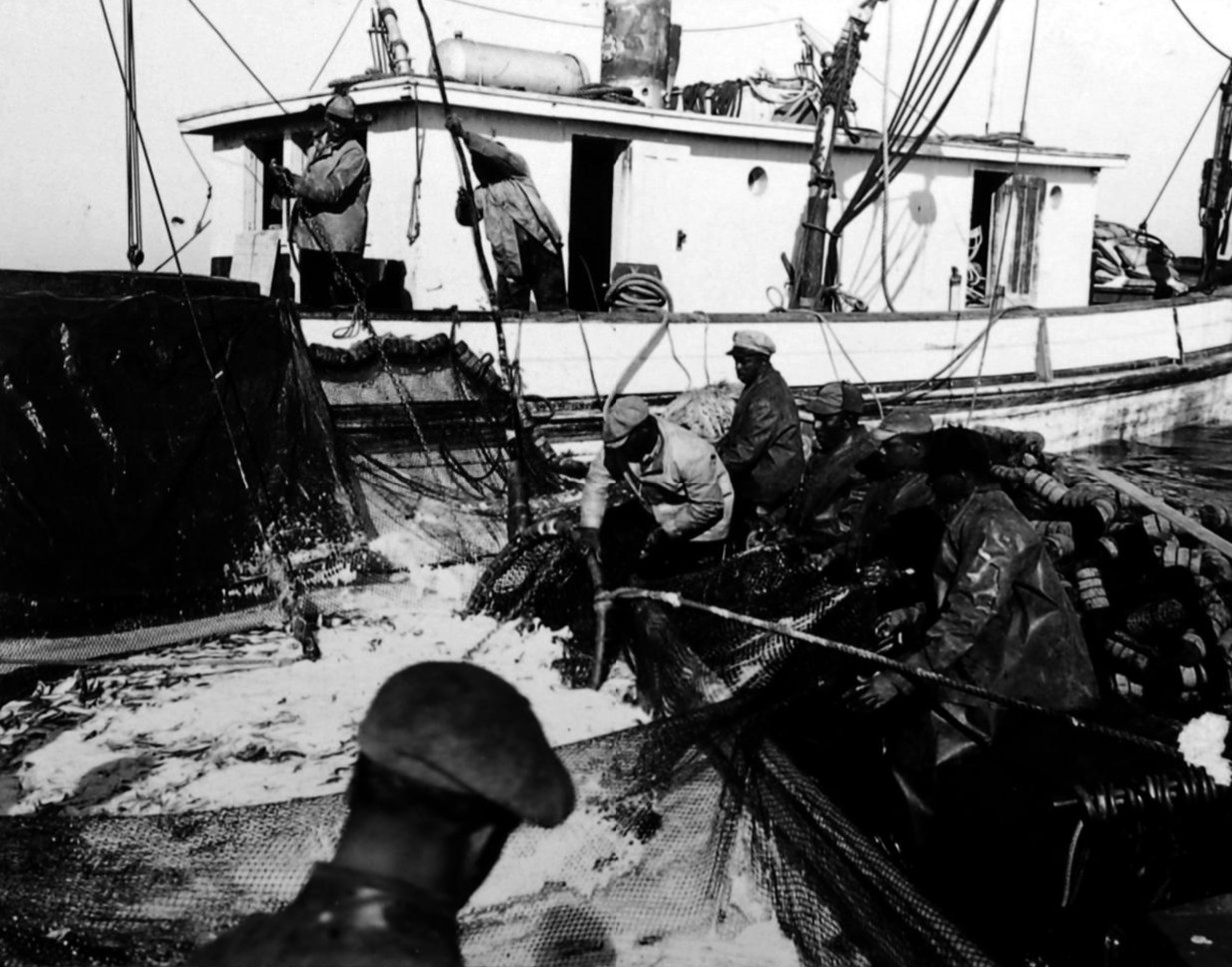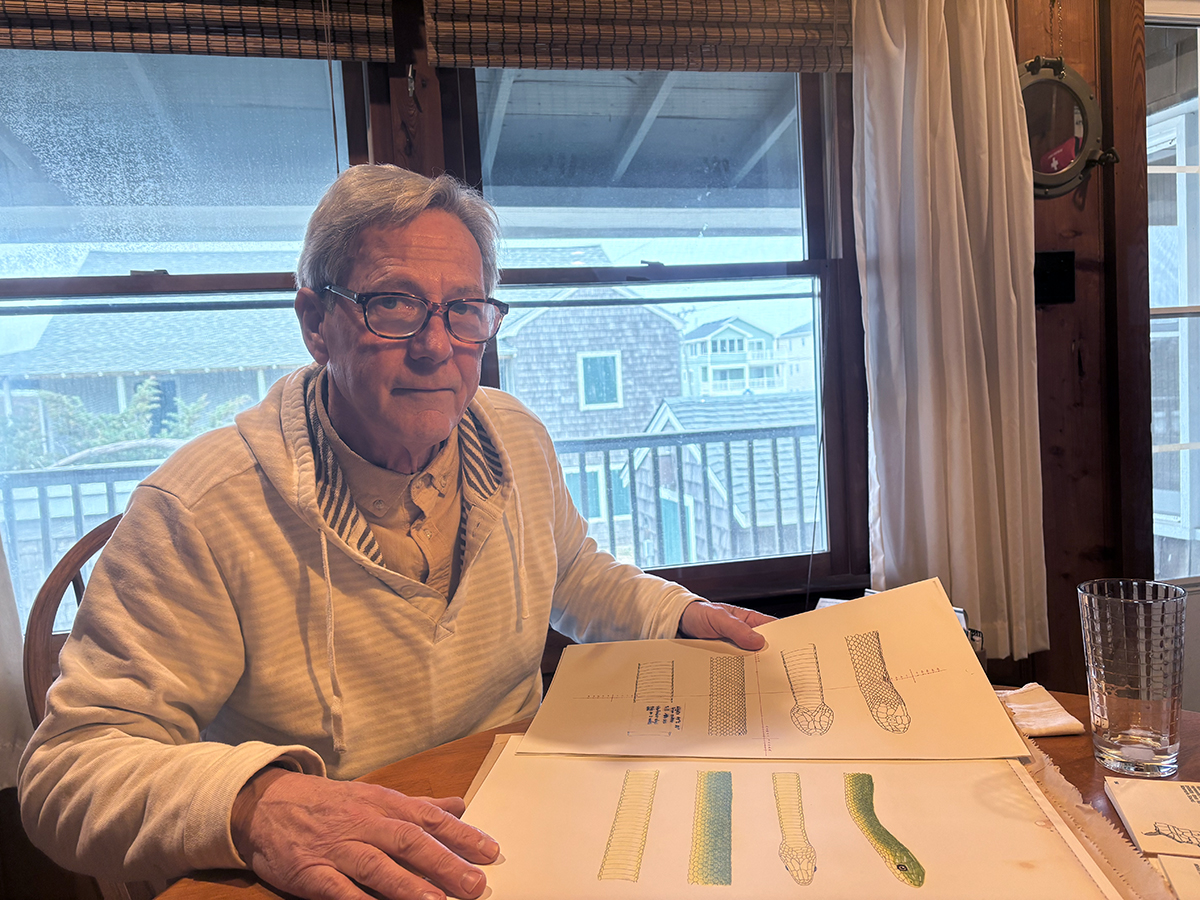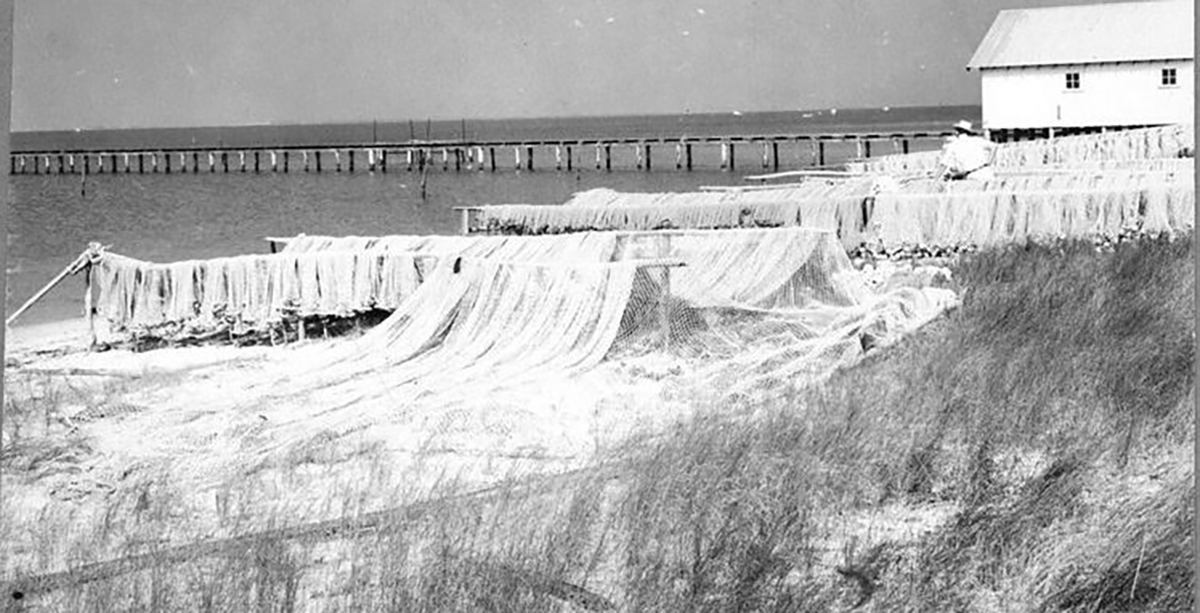SWANSBORO — April Clark, an entrepreneur and member of the North Carolina Coastal Federation Board of Directors, has mastered the enviable task of working for a living, having fun and doing good things for her community and its environment.
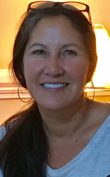
And it all came about, not so much by design, but by, well, if not happenstance, maybe intuition. Or maybe necessity. Or some combination of all that. But it happened.
Supporter Spotlight
Clark, who owns and operates Second Wind Yoga and Eco-Tours in Swansboro, was born in West Virginia, but grew up nearby, in Jacksonville. Her father was in the Marine Corps, and she went to Jacksonville High School and graduated in 1980. It was a pretty normal Onslow County life.
But eventually, April’s father got transferred to Guantanamo Bay, in Cuba, and she discovered waters that were, well, nothing like she’d seen back home. It’s not that the waters of Onslow were filthy, it’s just that those Cuban waters, the Caribbean, were so … unspoiled, so clear. You could dive and see all that was around you, April recalls, and it was unforgettable, when she started diving, there and in south Florida. By her early 20s, she was a certified diving instructor, though she never did it for a living. She did, however, use the skill to clean boat hulls. That, she recalls, was hard work. But the job, and diving in general, were eye-openers.
“It was so quiet, and you could see all of the life on such a micro-level,” she said. “It gave you such an appreciation for what was there, for what so many other people don’t get a chance to see. You don’t forget that.” She also visited the Bahamas and the Cayman Islands, which, again, offered unspoiled views of marine life.
Clark eventually returned to North Carolina and earned her college degree from East Carolina through Mount Olive, and got a master’s degree from UNC-Wilmington. Her master’s thesis was on the present and future of a coastal North Carolina town: namely, Swansboro.
Clark concedes she drifted a bit, having fun, living the party life, and eventually found her way into corporate sales, working for 16 years for U.S. Cellular and other tech firms. It was a turning point. The pressure of the corporate life convinced her she needed stress relief, a whole lot of it, and she found in it in yoga. She took to yoga like a fish in water, learned it, mastered it and learned to teach it.
Supporter Spotlight
Later, when Clark got laid off from U.S. Cellular, she received a severance package, and she used that money to start Second Wind, with a few kayaks to rent and the idea that kayaking and yoga somehow fit. Second Wind was both literal and figurative.
“It made sense to me,” she says now, looking back. “There was something about being out on the water, floating, sometimes calmly, but getting exercise, and being in the natural environment, and combining that with yoga, that just felt right.”
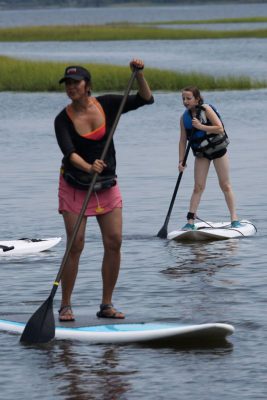
Slowly but surely, that combo led her into activism. She saw trash in the water during the paddles she led, and started picking it up and encouraging others to do so. It became part and parcel of Second Wind. It fit, especially for someone who’d always prided herself on fitness and a holistic lifestyle. She was also a big believer in collaborative work, which she believed, and still believes, creates synergy; as such, her first partner in her work was the North Carolina Coastal Federation, working on fundraising events. Talk to her long enough and you’ll hear lots of talk about collaboration and synergy.
Clark also credits her work with the Swansboro Rotary Club for her success in both business and activism; Rotary’s motto is “Service above self,” and she believes in that wholeheartedly. Rotary also is great for networking, and while some might think of the organization as conservative and almost totally business oriented, she’s managed to get Rotary clubs in the area involved in cleanups of area waterways, getting members to hit the water in kayaks to pick up trash. It is service, she says, and they get that.
It was, after all, a natural extension of both her personal and business life. Kayakers want clean waterways, and yoga practitioners in general celebrate and honor their surroundings; they want to be a positive part of the web of life.
“I love having the ability to offer something unique to our customers, to let them know that while they are kayaking or canoeing, they can do something good for the community,” she said. “And there’s just something beautiful about being able to do yoga on an island in the middle of a clean waterway. It’s a way to de-stress and do some good at the same time, to leave the area better than you found it. We’ve found that it works well together.”
The whole business has worked out far better than Clark expected, but it’s been and still is a challenge, as for all. Many other kayak tour businesses have opened in the area since she started Second Wind, and she works hard to stay ahead of the curve, expanding into massage and wellness programs, offering Tibetan singing bowl performances and different kinds of yoga – including yoga on stand-up paddleboards – to keep folks coming back to learn and participate in new things, and in environmental efforts.
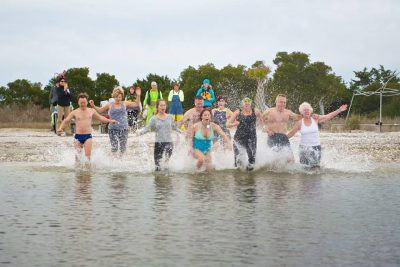
She’s also expanded her role in the community, joining the board of directors of the White Oak-New Riverkeeper Association, again, primarily in the role of a fundraiser, but also giving advice and helping in other areas, as needed. For the past few years, she’s led a New Year’s Day “polar plunge,” in which folks donate a small fee to kayak from Swansboro out to Pelican Island, maybe do some yoga there, then dive into the cold waters, albeit briefly. And maybe take home some trash. It is fun, but purposeful.
Her fundraising efforts have helped raise awareness of the riverkeeper association, which has been around for about eight years but hit troubled financial times and went for a few years without a waterkeeper until hiring Nicole Triplett in October 2015. The association is still struggling a bit, and Clark wants to help, but she thinks it has a great chance for a solid future, thanks to collaboration and synergy, those two words she likes a lot and values greatly.

The federation and riverkeeper association, she said, are not and should not be, competitors for resources and volunteers, but should and do complement each other. Riverkeeper groups, she said, are historically a bit more outspoken and at least, in public, more aggressive, more willing to use tough words and hard-hitting, confrontational tactics against polluters.
There are essential roles, Clark said, for the behind-the-scenes, often bureaucratic work that groups like the federation do – commenting on projects, lobbying in the legislature and in Congress and obtaining grants for things like natural shorelines and land purchases for conservation – and for the in-the-water, nitty-gritty, sometimes confrontational work that the riverkeepers’ groups do. Sometimes, of course, the roles overlap. And there again is that word she likes: synergy.
Clark thinks the federation and others involved in the environmental efforts along North Carolina’s long and varied coastline have made a huge difference and will continue to so. Sometimes, she said, progress is more measureable by what hasn’t happened – intense development in areas where it’s not appropriate – but there are also hopeful signs of proactive measures, such as increased use of natural living shorelines to protect against erosion instead of bulkheads, which destroy habitat for shellfish and other marine life.
“I feel like we are all, together, making a difference,” she said. “There a lot of people involved who work well together, and I think play an important and effective role in educating the public on what needs to be done and how they can be involved.”
She tries to incorporate those educational efforts into her business, and recalled a recent conversation with a woman – a conservative one might normally not expect to be receptive to environmental messages – while teaching yoga at the Jacksonville Chamber of Commerce.
“We were talking about the emphasis Brazil put on climate change during the (opening ceremonies) for the Olympics this year,” she said. “She said she didn’t believe in that. But we talked about the fact that things are changing, species are disappearing, habitat is disappearing. She said she’d look at it again.”
Clark said, that’s how environmental efforts grow, and how they become more effective over time: Getting a person, or a few people, at a time, to look at things from a different perspective.
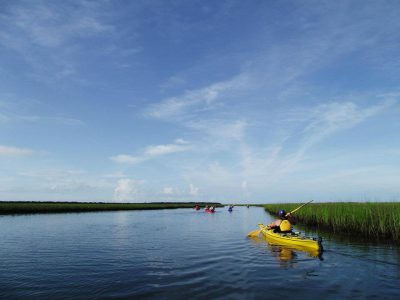
But as a business owner in a small town, Clark knows there’s a balancing act necessary to foster environmental protection and improvement and economic success – livelihoods – for those who live in the small coastal towns. And she thinks the federation has, and is doing, a great job in fostering that balance, convincing developers, whenever possible, to do things that might cost more in the short term, but might save money and effort in the long term, and in between preserve the environment that draws folks to the coast in the first place.
The success of her business, she said, is proof that there are jobs to be created, money to be made, in enterprises that don’t hurt, and in fact, help, the ecosystems around them. She started in 2010 with about 10 rental kayaks and now has 30, plus 10 stand-up paddleboards. It’s not unusual for almost all of them to be in the water.
She’s also proud that her town, Swansboro, has become more environmentally friendly in recent years, changing its unified development ordinance to more carefully address stormwater management and even implementing a stormwater management fee to help pay for improvements where needed, both for flood control and pollution abatement.
Swansboro, she said, is not unlike many of North Carolina’s coastal towns. Faced with tough economic times, it’s in a bit of a tug-of-war between those who think the environment can be sacrificed, at least somewhat, for jobs, and those who think that protecting and enhancing the environment is the key to maintaining jobs and creating new ones in an area dependent upon those who arrive looking for clean waters on which to fish and play.
“We as a community have to decide what we want to be, like so many others do,” Clark said. “Where is the balance? I’m willing to do my part, to call my town commissioners, to write letters and to use some of the money I earn. It’s very important to me.”



